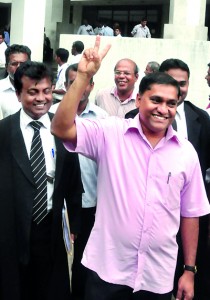News
CJ’s petition to Appeal Court fixed for tomorrow
View(s):Chief Justice impeachment procedure
By Wasantha Ramanayake

Vijitha Herath gives the victory sign as he leaves court with counsel Sunil Watagala. Pic by Mangala Weerasekera
The Court of Appeal on Thursday fixed for tomorrow the case filed by Chief Justice Dr. Shirani Bandaranayake, challenging the findings of the Parliamentary Select Committee (PSC), considering the urgency of the case.
The Bench comprising Justices S. Sriskandarajah, Anil Gooneratne PC., and A.W.A. Salam also issued notice on the Attorney General to appear before Court at 9.30 a.m. on Monday.
The Court fixed the argument for Monday after considering the submissions of President’s Counsel Romesh de Silva appearing for petitioner Dr. Bandaranayake who urged the court to hear the case on Thursday itself as a matter of urgency.He told Court that Parliament has already fixed the impeachment debate for January 10 and 11 and any delay would adversely affect the petitioner.
Counsel M.A. Sumanthiran appearing for PSC member and TNA Parliamentarian R. Sampanthan said the petitioner’s counsel has reasonable apprehension considering the phase of the proceedings before the PSC. He submitted that after the Opposition members of the PSC walked out of the proceedings around 3.30 in the evening the Government members called on 16 other witnesses next morning. Counsel J.C. Weliamuna with Sunil Watagala appeared for PSC member and JVP Parliamentarian Vijitha Herath and M.A. Sumanthiran with A. Vinayagamurthi appeared for PSC member and TNA Parliamentarian R. Sampanthan.
Both Counsel Sumanthiran and Weliamuna told Court that their clients would appear on the notice of the Court to assist the court but would not intend to file any documents.Respondents the Speaker, the members of the PSC representing the Government and the UNP were not present and were unrepresented.
The court then asked D.P. Mendis PC., and Nigel Hatch PC., appearing for two intervenient petitioners to tell court why they should be allowed to intervene in the proceedings.They were appearing for intervenient petitioners SLFP Government Trade Union Federation General Secretary Chandrasena Weerasekera of Kiribathgoda and Attorney-at-Law Sumudu Kantha Hewage who sought to dismiss the petition of the Chief Justice on grounds that the court does not have jurisdiction.
D.P. Mendis PC., told court that his client represents a large number of residents who represent citizens of the country and whose sovereignty could be affected if court is to make any order. Nigel Hatch PC., citing several judgments told court that court has the discretion to allow the intervention in the writ applications.
Romesh de Silva PC., appearing for the petitioner objected to the intervention on the grounds that there were no serious grounds for the intervention. Counsel Weliamuma also objected to the intervention since there were no serious grounds for intervention. He also told court there is no reason why the court should hear the intervenient petitioners even when important people such as the respondent PSC members decided not to participate in the proceedings.
After a brief adjournment the Court decided not to allow the intervention because intervenient petitioners would not make any adverse impact directly or indirectly on any order made by the court. However the Court noted that it would hear the Attorney General on this matter Meanwhile in its landmark reference to the Court of Appeal, the Supreme Court noted that only a court or tribunal or any other body authorised by law, but not a Standing Order of Parliament, can make a finding affecting the rights of a person in a state which is ruled by a Constitution.
The Supreme Court noted in its 27-page-long reference that the Standing Orders are not law within the meaning of Article 170 of the Constitution which defines what is meant by ‘law’, but they are rules made for the regulation of the orderly conduct and affairs of Parliament
Therefore, the Parliamentary Select Committee (PSC) appointed under Standing Order 78A has no legal authority to make a finding adversely affecting the legal rights of a judge against whom the allegations are made in the resolution, the Supreme Court added.
Court of Appeal President S. Sriskandharajah read out the Supreme Court decision which answered the question put forward by the Court consequent to the filing of seven cases challenging the inquiry against the Chief Justice before the PSC.
Seven petitioners including Chandra Jayarathne of Colombo 5, Ven. Maduluwawe Sobhitha Thera and Dr. Jayampathi Wickremaratne challenged Standing Order 78 A and the PSC arguing that the PSC did not have judicial powers to inquire into the allegations against Chief Justice Dr. Shirani Bandaranayake.
The Bench comprising Justices S. Sriskandharajah, Anil Gooneratne PC., and A.W. A. Salam issued notice, returnable on January 15, on the respondents – the eleven members of the PSC.
Follow @timesonlinelk
comments powered by Disqus



















